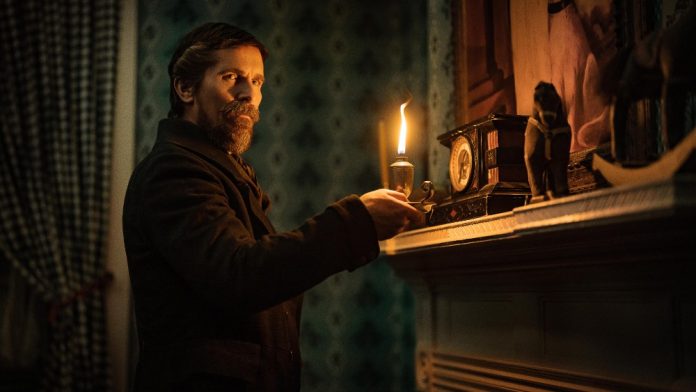Director Scott Cooper had made two prior films with Christian Bale that were both originals — 2013’s Out of the Furnace and 2017’s Hostiles — but for their latest collaboration, The Pale Blue Eye, Cooper turned to Louis Bayard‘s novel of the same name, which finds a young Edgar Allan Poe (Harry Melling) wrapped up in a grisly murder mystery at West Point in the early 19th Century.
At one point, Cooper thought Bale would be perfect to play the young Poe, but after developing the script for almost a decade, Bale wound up being a better fit to play Augustus Landor, the New York police detective sent to investigate the murder. At West Point, he meets Poe as a young recruit, and the two of them begin to investigate the murder, which occurred on the famed academy’s hallowed grounds.
Above the Line recently spoke on the phone with Cooper, who explained why he cast Melling as Poe, as talked about reteaming with both Bale as well as his regular DP Masanobu Takayanagi (who we’ll soon have an interview with over at Below the Line) and legendary composer Howard Shore.
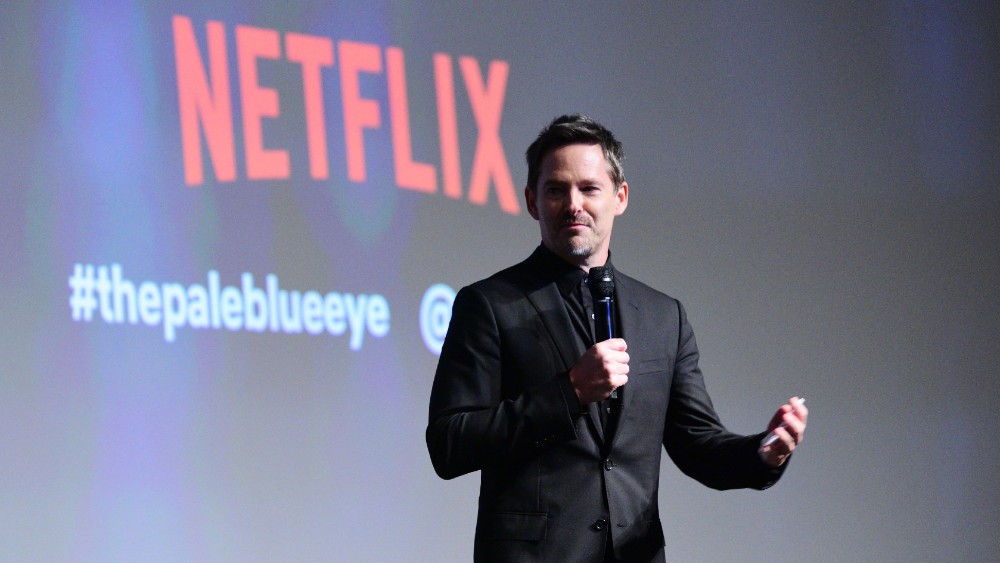
Above the Line: I’m glad I got to see your film in an actual theater because it looks and sounds so great, and it really benefits from the theatrical experience.
Scott Cooper: I’m grateful that this will reach a very wide audience, but I agree that this film does lend itself to a wider screen audience, but they’re also putting this into the cinema for two weeks before, so people will have an opportunity to see it.
ATL: Right, it’s playing at the Paris Theater in midtown over Christmas, so I’m sure it’s going to get a ton of tourist traffic.
Cooper: Which is one of my favorite theaters. We’ve had actually quite a great response, I have to say. All of our screenings have been pretty packed.
ATL: I know a little bit about the movie just from the Q&A you did with Tom McCarthy, where you mentioned that your father first gave you this book.
Cooper: That’s right. After Crazy Heart, my father introduced the novel to me. Much like Poe, I spent my formative years in Virginia — I lived in Virginia [and] I was born there. My father taught English and literature, and there was a lot of Poe in our house. After Crazy Heart, he sent me the novel for The Pale Blue Eye and said, ‘It’s so clever. There’s a young Edgar Allan Poe at the center of a detective story.’ He just sent it to me to pleasure-read, and of course, I read it and I thought, ‘My God. This would make for a really compelling and intriguing film.’
ATL: The author who wrote the book is still alive, right?
Cooper: He is still alive, yes. Louis Bayard — I’m gonna see him tomorrow night at the premiere. As it turns out, he well understands that there’s a difference between a novel and a film. So often, there are things that you have to excise from a novel, certainly as sprawling as The Pale Blue Eye, and you have to focus the narrative. I wanted it to be three things — a whodunnit, a kind of father-son love story, and an Edgar Allan Poe origin story, [in] that the events that take place in this movie ultimately inspired him to become the writer he became.
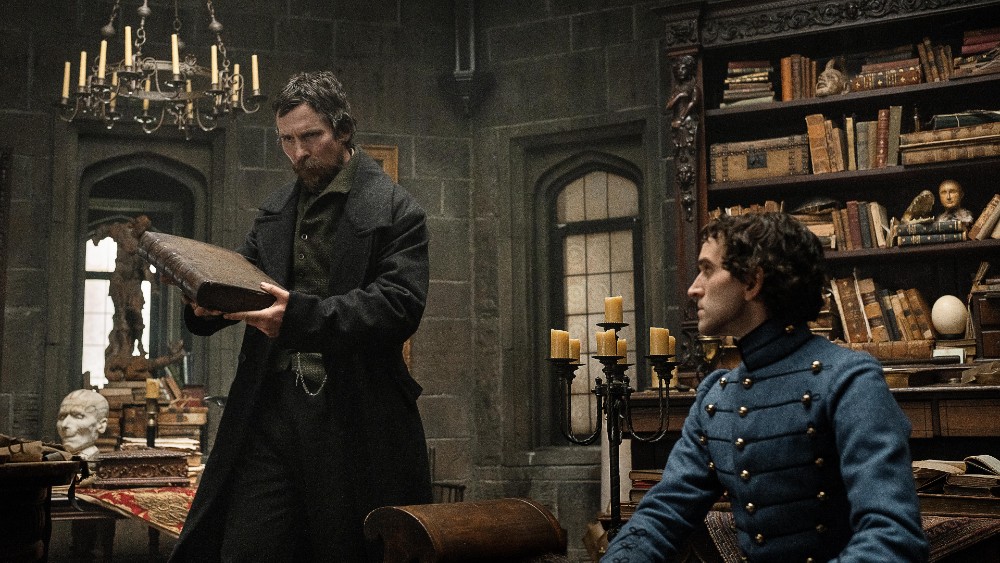
ATL: Did you do a lot of research about Poe’s life, or was this always meant to be a fictionalized take on the famed author?
Cooper: Well, Poe was at West Point for seven months. I did a great deal of research on Poe and his works, thematically, so they could course through our narrative, I’ve been to the Poe Museum in Richmond, Virginia — again, I’m from Virginia — many, many times. We are entrenched with understanding who Poe is, right from [being] the author of The Raven, and someone who was a purveyor of the macabre and obsessed with the occult and the Satanic, [to] someone who bequeathed to us The Telltale Heart and A Premature Burial.
So that’s the Poe that we all know, but we don’t know young Edgar Allan Poe, and that’s what I’m trying to put forth — someone who was warm and humorous and witty and prone to poetic and romantic musings, which I thought was more interesting. And then, through this movie, we see him become the darker version that we all know and love.
ATL: I’m immensely amused by how Poe has become a fictional character in his own right, similar to Shakespeare a bit, and how there have even been comic books about him — not just novels or movies, but comic books.
Cooper: Yeah, that’s right. I had to guard against that because again, we all have an idea of who Poe is because of that later work and the fact that he died under mysterious circumstances in that Baltimore alley. I had to fight against that and say, ‘Well, who was this man before that? And how did he become that writer?’
ATL: By the way, were you shopping The Pale Blue Eye around a lot before it wound up at Netflix, or did you just go to Netflix first and they said, “Yes”?
Cooper: What I normally do with my movies is I write them, and then I cast them, and then I take — or I don’t, my agents [do] — my projects out to the larger community, and then people will bid on them. Fortunately, we had quite a number of suitors for this, but Netflix made an overture that I couldn’t quite pass up, and they have been remarkable partners. Great filmmakers, incredibly supportive. It’s been lovely.
ATL: As I was watching the movie, I don’t think I knew who Harry Melling was, although I later realized I saw him in Antonio Campos’ movie a couple of years back.
Cooper: Which I did not see. I had only seen him in the Coen brothers‘ The Ballad of Buster Scruggs [in which] he’s a limbless performer. He’s remarkable. I think he gave the best performance of that year.
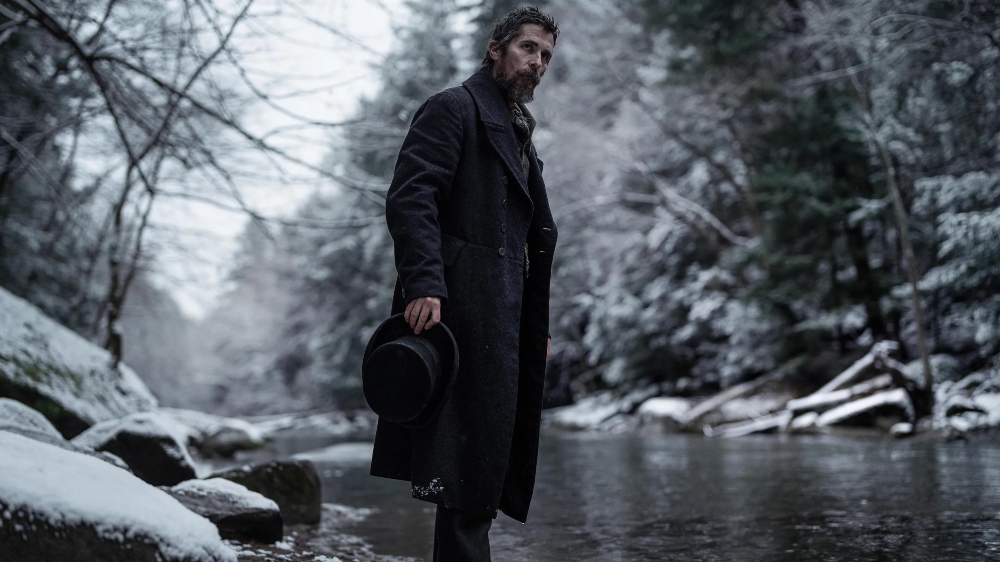
ATL: So just seeing him in that Coen brothers movie was enough of you to think of him for Poe?
Cooper: Yes, absolutely. He had the right bearing, he could handle my language. He felt very period, perfect. He had the eccentricity I was looking for, and I could see the shades of a misfit. But he also could play vulnerable, and he could play the heartbreak, so it was really important that I find an actor who [could] capture all of that, because it’s quite a heady role to play, young Edgar Allan Poe, and sure enough, here we are.
ATL: Since Christian has been your collaborative partner for a number of movies, was he involved with the decision to cast Harry? Did he meet or read with Harry or did he just have to trust your instincts on the casting?
Cooper: I sent the screenplay to Harry, who lives in London, and Harry so graciously put himself on tape and sent it to me. It was obvious from that one reading that he was the perfect and only choice to play Edgar Allan Poe. And Christian said, ‘My God, why look any further?’
ATL: There are a lot of great British actors I enjoyed seeing in your movie, maybe because they weren’t necessarily in the trailer, or in it much, so I was pleasantly surprised, as I always like seeing them in movies and such.
Cooper: Same here. I mean, quite frankly, I make very American films, and they’re generally populated with American actors, but in this instance, it gave me an opportunity to cast my favorite British actors — Toby Jones, Timothy Spall, Simon McBurney, Gillian Anderson, young Lucy Boynton, Harry Lawtey, [and], of course, Harry Melling — because they feel very period. They can inhabit those roles and those costumes so easily, and they can handle the dialect and the language with aplomb.
ATL: Did you shoot this anywhere near the real West Point?
Cooper: The endings were shot near Storm King, New York, just near the Hudson Valley, near West Point, and then the rest of it was shot in Western Pennsylvania along the Allegheny Mountains, which is the same kind of mountain chain of the Appalachians that kind of course up through there.
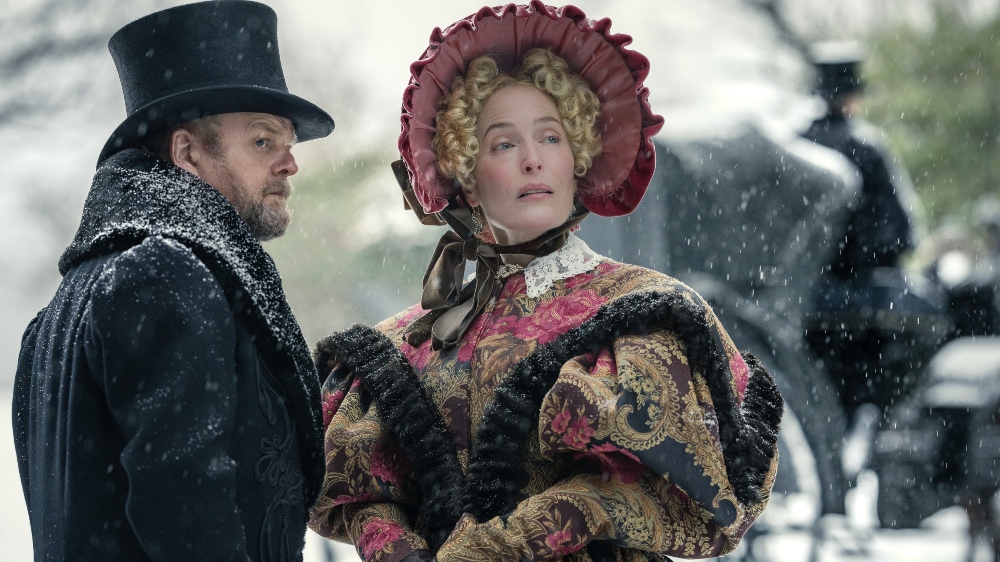
ATL: I assume all the snow was real, and this was shot during the winter there?
Cooper: Oh, yeah. It was incredibly cold [and] snowy — minus eight below zero, minus four below zero. It was a terribly difficult film to make.
ATL: It’s amazing that you were able to bring all these British actors over here to shoot a movie, as I have a feeling many of them are used to working over there.
Cooper: Yeah, that’s right, and they all had to come over during peak Omicron to Western Pennsylvania, which was no easy feat, and then trying to keep them healthy. And then, of course, just the weather was so cold, and the snow was brutal and kind of [left] inaccessible shooting locations. But in the end, I hope it serves the story, because so often when I see period films, I feel like it’s all make-believe and feel like they’re actors just wearing costumes. All of our costumes were handmade. I have a brave enough cinematographer, production designer, and costume designer to not show their work, [and] let all the period details recede [into] the background in service of character and story. It takes an artist with a lot of confidence to do that, and they all did.
ATL: And this was your fourth movie shot by Masanobu Takayanagi, correct?
Cooper: It is, yes, our fourth film with Masa. Antlers was shot by Florian Hoffmeister, who just shot Tár.
ATL: And he might get an Oscar nomination for that.
Cooper: Oh, good for him. I mean, his work in Antlers was remarkable.
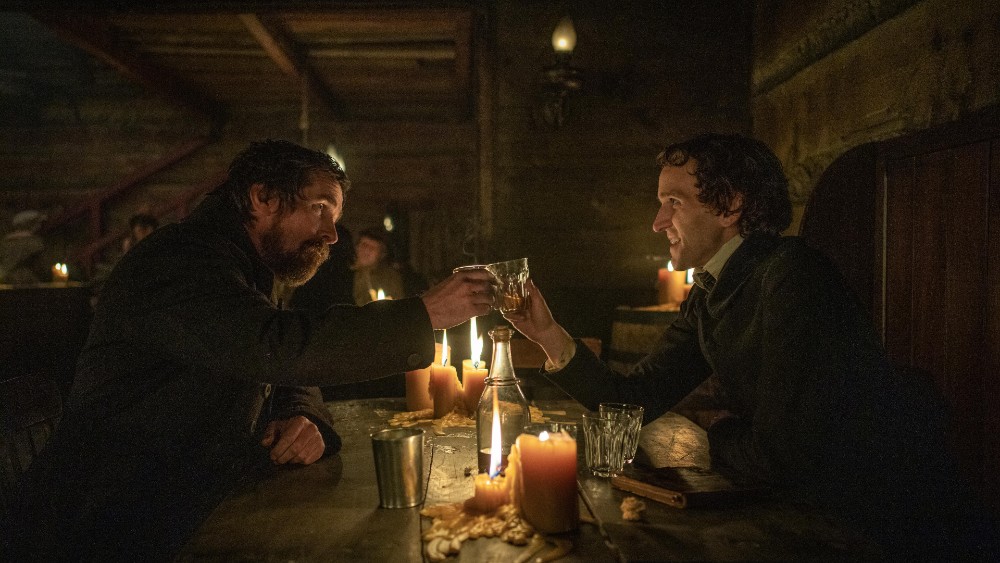
ATL: The Pale Blue Eye has a very different look than the other movies you did with Masa. What were some of your early conversations about what you were looking for in the film’s look?
Cooper: I said to Masa, ‘Look, this is a film that, though in color, should feel almost like black and white.’ We looked to the artist Caspar David Friedrich, the German expressionist. We looked at his paintings. We looked at the Hudson River School of paintings. For the interiors, we looked at the Dutch masters, Rembrandt. We looked at Barry Lyndon, if you’ve seen that [Stanley] Kubrick film. Those were all influences. I wanted natural light in the interiors that Masa, of course, shaped, and then I wanted the exteriors, which he also shaped in a way that made [them] feel very gothic and cold. I hope it was effective.
ATL: Were Christian and Masa aware of this project back when you were doing earlier movies together, like Out of the Furnace?
Cooper: Yeah, and Christian loves Masa’s work. He loves his compositions, he loves his lighting, he loves his attitude. Masa is very precise with composition [and] framing. We speak at great length about where we’re going to place the camera, when we’re going to move the camera, [and] more importantly when we’re not going to move it, right? Because you see every kid in film school, all they want to do is move the camera, [and] very often when it’s unmotivated. So if you watch the masters, if you watch [Alfred] Hitchcock and you watch [Akira] Kurosawa, and you watch Kubrick, [Francis Ford] Coppola, you’ll understand that camera movement is not arbitrary.
ATL: Speaking of Christian, I think you’ve mentioned that you originally were thinking of him to play Poe, but that was 10 years ago or longer, and then you realized he would be better for Lando. Is that true?
Cooper: Probably, and he was in between Poe and Landor, and then he perfectly aged into the kind of world-weary, legendary constable — someone who suffered a lot of pain and loss, regret, [and] grief, and he aged perfectly into [that] part.
ATL: I also want to ask about working with Howard Shore, an absolute master who has scored many amazing films. Was he someone you’ve wanted to work with for some time and just had to find the right project?
Cooper: Oh my God, he’s a legend, Howard Shore! And he expresses the beauty of the Gothic world, the pain of [the] Gothic world [and] the horror, in ways that some composers can’t. He’s [also] really great with themes, and he’s really great with eliciting and supporting emotion, and I think his score is just tremendous.
ATL: Did you get him on board as early as the script stage?
Cooper: Oh, yeah. He read my screenplay, then he read the novel, and I would send him images from the set and dailies, and he writes everything by hand. I can’t say enough about collaborating with Howard Shore. It’s a dream to work with Howard Shore. If you look at his work with [Martin] Scorsese and [David] Fincher, [or his] 16 movies with David Cronenberg, the way that he can write something that’s so emotional, but also, he understands darkness and pain, but also beauty. I think he expressed all of that in this score, and he writes beautiful themes — a theme for Landor and Poe, and a theme for Poe and Lea (Boynton), and the theme for Landor and his daughter — and then being able to bring them all together into the dénouement really takes a masterful composer. And then you have the Berlin Philharmonic bring it to life, and out of that [comes], I think, a tremendous score.
ATL: I’m going to ask you a strange question because the movie looks beautiful, just the way it’s shot, and all the work by your production and costume designers, etc. But it’s not the kind of movie that screams visual effects, so I was curious whether you still used VFX for things like the snow.
Cooper: Only, really, in support… [it was used for] fire. There was fire in that sequence, but you can’t really ask an actor to be too close to fire, although Lucy Boynton, Christian, Harry, and Gillian, they all were pretty close to it. We needed to augment some of that as it grew. We could only take it to a certain point, and some of the things that fall that might land on an actor, some of that was practical, as well, and then others we augment.
I like to use [VFX] as a tool to augment what it is that might be too difficult, or too injurious to an actor. You never want to put an actor in a compromising position. Safety is always critical and [comes] first on my sets, and it was really important that we have great stunt coordinators in concert with my visual effects supervisor, Jake Braver, so that nobody is ever in harm’s way.
ATL: Do you think you’ll jump into another movie right away? Have you already written that might be ready to go into production soon?
Cooper: I literally just delivered this. I was meant to have it ready for the Venice Film Festival in September, and I missed that by about three or four months, just finishing the movie, [so I] just delivered it. I think you probably saw [a] work-in-progress earlier on, but now it’s finished. I have written a couple of things. One, for sure, that Mr. Bale and I will make — I don’t know if that’ll [be] next, but he may be in the next one as well. I mean, if I’m being truthful, he sees everything first, and I love working with him.
ATL: I also loved seeing Robert Duvall in this film because I know he’s become a bit of a mentor to you since your first film, Crazy Heart.
Cooper: Oh, I mean, Duvall’s like a second father to me, more than even a mentor. I speak to him two or three times every week, sometimes every day, and he really wanted to be in this part. He adores Christian, and now he’s obsessed with Harry Melling — he thinks he’s amazing, certainly as Poe. I think he really was quite overjoyed to be in this. He’s 92 years old.
I have written a screenplay that, at some point, Christian and I will make, and then also, I wrote something for Robert Duvall. Hopefully, we can make that one [at] the right time, but when a movie gets made, so often, is beyond your control. It has to do with timing, and it has to do with availability, and also the vicissitudes of the film business, because so often these kinds of movies that I like, [it doesn’t] appear that people are showing up in the theaters to support [them] at the moment.
That could be because of COVID, could be because people have become quite comfortable watching movies in their homes. I think going to movies can be expensive when you factor in babysitters and parking, concessions, and all those sorts of things. It feels to me like we’re at an inflection point, but people will come out to see Top Gun. They’ll come out to see whatever the latest Marvel film is, and I suppose they’ll come out to see Avatar. Perhaps that’s all helping to get people into the cinemas, and that’s always a good thing.
The Pale Blue Eye is now playing in select theaters and it will begin streaming on Netflix on Jan. 6. Look for our upcoming interview with Cooper’s long-time cinematographer Masanobu Takayanagi over at Below the Line, and click here to read our previous interview with Cooper.


